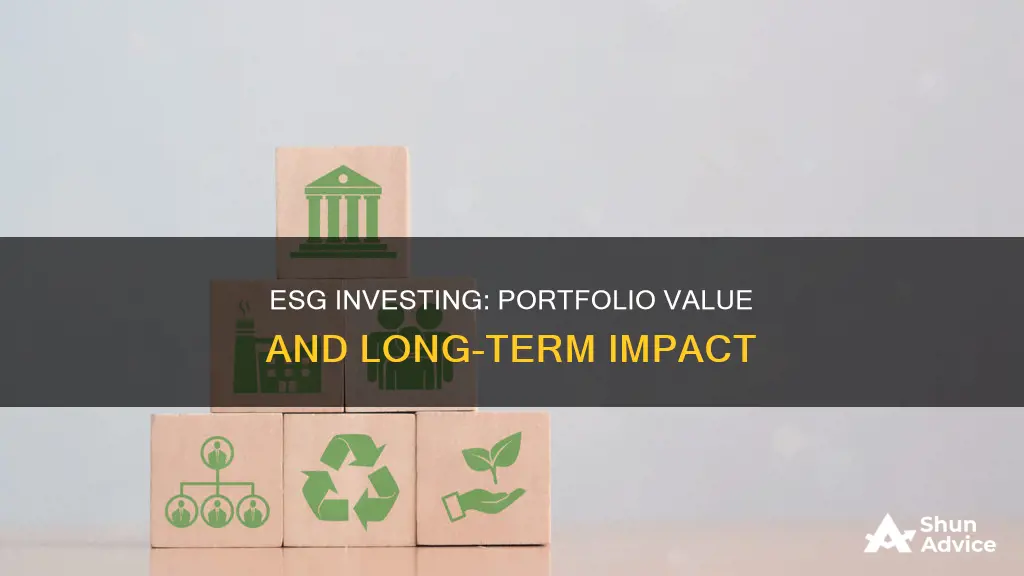
Environmental, social, and governance (ESG) investing is a strategy that enables investors to make a difference with their dollars by supporting companies that demonstrate policies congruent with improving the environment, positive social justice, and furthering sound governance. ESG investing is a way to build a more ethical portfolio and is used to screen investments based on corporate policies to encourage companies to act responsibly.
ESG investing is based on the assumption that the financial performance of organisations is increasingly affected by environmental and social factors. It is widely considered a way of investing sustainably by making investments with consideration of the environment and human well-being, as well as the economy.
ESG investing has gained traction in recent years, with $30.7 trillion currently sitting in sustainable investment funds worldwide, and it is predicted that this could rise to around $50 trillion in the next two decades.
| Characteristics | Values |
|---|---|
| Environmental factors | Air and water pollution, green energy initiatives, carbon footprint, climate impact, natural resource conservation, toxic waste management, compliance with environmental regulations |
| Social factors | Employee gender and diversity, customer satisfaction, company sexual harassment policies, employee wellbeing, company health and safety track record, racial diversity, LGBTQ+ equality, inclusion programs, hiring practices, community impact |
| Governance factors | Diversity of board members, political contributions, large-scale lawsuits, accurate and transparent accounting methods, integrity and diversity in leadership, leadership's interaction with shareholders |
What You'll Learn
- ESG investing helps investors avoid companies with risky or unethical practices
- ESG investing can deliver equal or superior investment returns
- ESG investing enables investors to align their investments with their personal values
- ESG investing helps investors identify companies with strong ESG scores
- ESG investing helps investors identify companies with a holistic view of their operations

ESG investing helps investors avoid companies with risky or unethical practices
The environmental criteria consider a company's impact on the environment, including their carbon footprint, energy use, waste, pollution, and natural resource conservation. By evaluating these factors, investors can identify companies that are proactively managing their environmental impact and reducing risks associated with climate change and natural resource depletion.
The social criteria assess a company's relationships with internal and external stakeholders, including employees, suppliers, customers, and communities. Investors can favour companies that demonstrate a commitment to employee wellbeing, workplace health and safety, diversity and inclusion, ethical supply chains, and community involvement.
The governance criteria focus on a company's leadership, executive pay, audits, internal controls, and shareholder rights. Investors can prefer companies with transparent and diverse leadership, ethical business practices, strong accounting practices, and a commitment to shareholder interests.
By considering these ESG factors, investors can avoid companies with risky or unethical practices and make more sustainable and socially responsible investment decisions. This not only helps mitigate risk but also enables investors to support companies that are driving positive change and contributing to a more just and sustainable society.
Saving and Investment: Synergistic Strategies for Financial Growth
You may want to see also

ESG investing can deliver equal or superior investment returns
Morningstar research uses a new model to compare the returns of companies with strong and weak ESG practices. Its study found no risk/reward trade-off to investing in ESG on a global level and only a slight cost if limited to U.S. and Canadian holdings. The study adds to the growing body of evidence that investors do not have to sacrifice risk or returns to invest in ESG investment vehicles.
The explosive growth in ESG investing has created considerable confusion about what investors should expect. Academic studies that have examined how ESG factors relate to both corporate operating performance and investment outcomes have found mixed results. Effects on operating performance appear consistently (though not uniformly) positive and suggest companies with high ESG scores are better in a number of ways. The evidence on investment returns is more ambiguous — some studies find the stock prices of companies with high ESG ratings outperform, but others find no measurable effects, and some even document lower monetary returns.
ESG investing can help portfolios avoid holding companies engaged in risky or unethical practices. ESG investors help inform the investment choices of large institutional investors such as public pension funds. As ESG business practices gain traction, investment firms track their performance. Financial services companies such as JPMorgan Chase, Wells Fargo, and Goldman Sachs publish annual reports that extensively review their ESG approaches and the bottom-line results.
Calculating ROI on Your Investment Portfolio: A Step-by-Step Guide
You may want to see also

ESG investing enables investors to align their investments with their personal values
Environmental, social and governance (ESG) investing enables investors to align their investments with their personal values. ESG investing is a form of sustainable investing that considers environmental, social and governance factors to evaluate a company's performance and overall impact.
ESG criteria allow investors to assess a company's commitment to improving the environment, promoting social justice, and demonstrating sound governance. Environmental factors include a company's carbon footprint, energy use, waste reduction, and natural resource conservation. Social criteria evaluate a company's treatment of employees, suppliers, customers, and communities, including its stance on LGBTQ+ equality and racial diversity. Governance measures examine a company's leadership, executive pay, audits, internal controls, and shareholder rights.
By considering ESG factors, investors can make informed decisions that align with their values and contribute to a more just and sustainable world. This approach allows investors to support companies that demonstrate ethical behaviour and strive to create positive societal change.
Additionally, ESG investing offers potential financial benefits. Studies have shown that ESG investments can deliver equal or superior returns compared to traditional investments. ESG funds have also demonstrated lower downside risks during turbulent market conditions.
ESG investing provides a framework for investors to integrate their values with their investment choices, driving positive change and potentially achieving strong financial performance.
Assessing Investment Portfolios: A Comprehensive Guide
You may want to see also

ESG investing helps investors identify companies with strong ESG scores
ESG scores are calculated by several different companies using varying methodologies, meaning there is no one authority on ESG scores. Most providers outline specific ESG indicators, such as climate change effect, political contributions, and natural resource conservation, but those indicators often differ depending on the provider.
ESG scores are based on information from securities filings, corporate disclosures, government databases, academic studies, and media reports. Screeners typically assign companies and funds an ESG score between one and five, with leading companies in each industry having an ESG score of AA or AAA.
ESG investors can use these scores to help inform their investment choices. ESG-specific mutual funds and ETFs reached a record $480 billion AUM in 2023. Brokerage and mutual fund companies offer exchange-traded funds (ETFs) and other financial products that follow ESG investing strategies.
ESG scores can help investors identify companies with strong ESG practices, thereby enabling investors to build more ethical portfolios.
ESG investing can also help portfolios avoid holding companies engaged in risky or unethical practices. For example, Trillium Asset Management's ESG criteria preclude investments in companies that operate in higher-risk areas or have exposure to coal or hard rock mining, nuclear or coal power, private prisons, agricultural biotechnology, tobacco, tar sands, or weapons and firearms.
ESG scores can also help investors identify companies with strong long-term resilience. For example, an ESG portfolio takes into account the inherent risks that companies can face from issues such as water scarcity, poor data security, or climate-related production declines.
In addition, companies with strong ESG scores generally present lower risks. For example, a company with strong supply chain management presents a lower risk than one with supply chain vulnerabilities.
ESG scores are a powerful resource for investors to identify companies with strong ESG practices and build portfolios that align with their values.
SSS Workers Investment and Savings: A Guide to the Program
You may want to see also

ESG investing helps investors identify companies with a holistic view of their operations
The environmental criteria examine a company's impact on nature, including carbon footprint, waste management, and natural resource conservation. Social factors assess how a company treats its employees, suppliers, customers, and communities, covering areas such as workplace conditions, diversity, and community involvement. Governance factors focus on the leadership and management of a company, including executive pay, board diversity, internal controls, and shareholder rights.
By considering these ESG criteria, investors can gain a more comprehensive understanding of a company's operations and identify those that demonstrate responsible and ethical practices. This holistic view enables investors to make more informed decisions and align their investments with their values.
Additionally, ESG investing can help investors identify long-term risks associated with poor governance, environmental, or social practices. For example, a company with poor governance may face security breaches or employee strikes, while a company heavily reliant on non-renewable resources may face supply chain issues due to climate change. Thus, ESG investing provides a valuable tool for investors to assess companies' operations and make strategic decisions.
Planning Savings and Investments: Strategies for Financial Freedom
You may want to see also
Frequently asked questions
ESG stands for Environmental, Social, and Governance. ESG investing refers to how companies score on these responsibility metrics and standards for potential investments.
ESG investing is sometimes referred to as sustainable investing, responsible investing, impact investing, or socially responsible investing (SRI). To assess a company based on ESG criteria, investors look at a broad range of behaviours and policies.
For many people, ESG investing is more than a three-letter acronym. It is a practical, real-world process for addressing how a company serves its stakeholders: workers, managers, communities, customers, and shareholders.
ESG scores are calculated by several different companies using varying methodologies, meaning there is no one authority on ESG scores. Most providers outline specific ESG indicators, but these often differ depending on the provider.
ESG investing helps to ensure your investment choices are aligned with your priorities and personal values. It can also offer higher returns.







